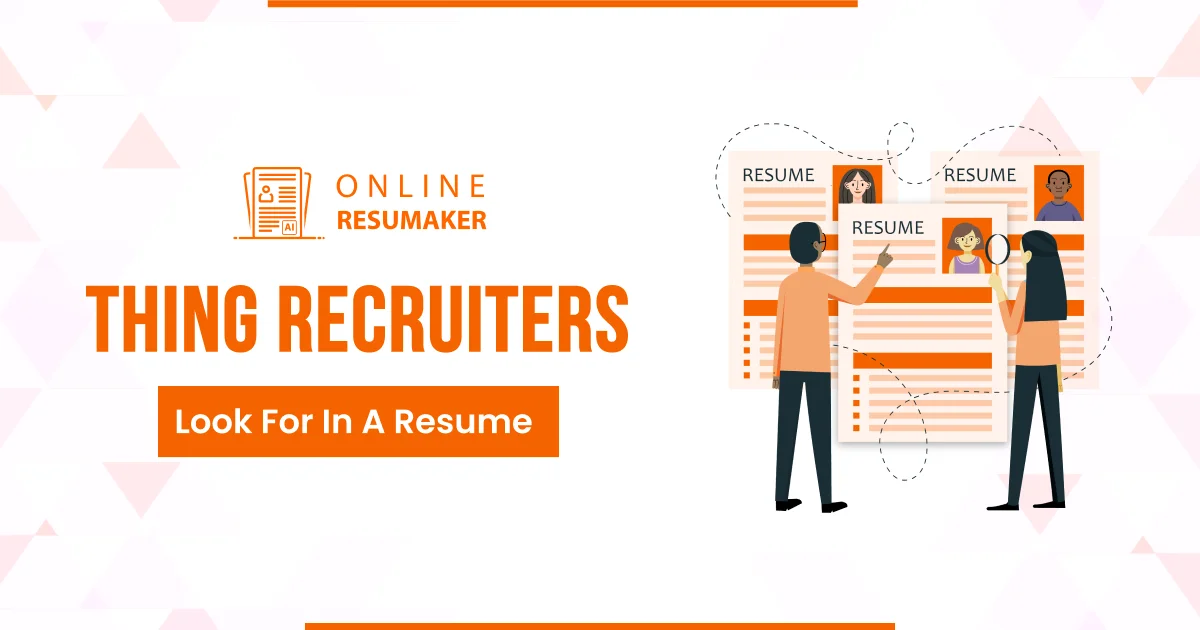To secure an interview, your resume needs to capture attention instantly. Recruiters often look through a multitude of applications, scanning resumes.
Here are the tips to enhance your resume by clearly and concisely presenting key details.
Enhance your resume by emphasizing quantifiable achievements, concentrating on relevant skills, and modifying it to the job requirements. Consider incorporating a summary or objective that highlights your unique strengths. This strategy attracts attention and increases your chances of hiring.
Component of Recruiters Want to See on a Resume
Here are the components are as follows:
Contact Information:
Ensure your resume includes your full name, phone number, professional email address, and, if applicable, a link to your LinkedIn profile.
Ensure that all contact details are up-to-date, projecting a polished and professional image. Write every piece of information accurately.
Career Summary:
Create a strong statement outlining your career objectives, fundamental skills, and what you bring. Personalize this section to match the specific job requirements you're looking for.
Build Strong Work Experience:
Create a strong list of your work history. Begin each bullet point with dynamic action verbs, highlighting your accomplishments and contributions.
Use numbers or percentages to quantify your achievements. Highlight the most relevant experience that aligns with the job description.
Roles and Responsibilities:
You'll need to create your resume for each job, so your job titles and responsibilities must align with the job you are applying for. Emphasize your achievements and contributions in each role.
Professional Experience:
Create a consistent and relevant experience section on your resume. Clearly specify your contributions and added value, particularly in significant projects. Quantify your achievements to provide concrete evidence of your impact.
Skills:
Include all skills attained in your previous roles in the form of bullets. Align your skills with the job's specific requirements to demonstrate your suitability. List down how your skills have improved and enhanced your overall experience.
Results and Achievements:
Highlight quantifiable results and achievements from your past roles. Clearly describe your targets in terms of amounts or percentages, showing instances of overachievement.
Education:
List your relevant educational certificates, especially if they are essential or desirable for the position.
Creating Recognition:
Make a conscious effort to show any notable achievements, awards, or recognition you've received. Concentrate on accomplishments that prove your impact and value.
Certifications:
List down any strong certifications you hold, including the following:
- Certification Name
- Issuing Organization
- Completion Date.
Projects:
Write your projects in bullet form. Highlight significant projects you've been involved in. You can even describe your role, the project's purpose, and the outcomes achieved.
Volunteer Work:
- List down volunteer experience that shows transferable skills or relevant experience.
- List down leadership roles and meaningful contributions to show the positive roles you have done in previous companies.
Professional Memberships:
Include any memberships in professional organizations relevant to your field.
Formatting:
- Maintain a well-organized and easily readable resume format.
- Utilize a clean and professional font, ensuring consistency in formatting.
Length:
- Try to keep your resume to one page.
- Prioritize information based on its relevance to the job.
Remember, while possessing the right skills and experience is crucial, presenting them clearly in an optimized resume is equally important. By refining these elements, you enhance the chances of effectively capturing the attention of hiring managers and recruiters.
Key Resume Skills Employers Seek
Recruiters seek specific skills in resumes that highlight your ability to show in their workplace and achieve results.
Here are examples of skills hiring managers commonly look for:
Adaptability:
Ability to adjust to various situations and use them to benefit the company.
Communication:
Effective written and verbal communication skills for interacting with colleagues, clients, and stakeholders.
Organization:
Skilled in managing time, tasks, and deadlines efficiently.
Integrity:
Demonstrated honesty and trustworthiness, especially with confidential information.
Problem-solving:
Capacity to provide quick and effective solutions to challenges.
Teamwork:
Ability to excel and collaborate in a team environment.
Responsibility:
Willingness to take ownership of tasks and learn from mistakes.
Attention to Detail:
Ability to follow instructions and complete work with accuracy.
Emotional Intelligence:
Skill in managing emotions and navigating interpersonal relationships positively.
Analytical and Logical Thinking:
Capability to analyze data and think critically to draw valuable insights.
Negotiation:
- Skill in negotiating deals
- Partnerships
- Transactions
- Customer Service:
- Ability to effectively address customer needs and concerns.
Computer Software and Applications:
Proficiency in relevant software and applications for the job.
Project Management:
Experience in overseeing and completing projects efficiently.
Reliability:
Consistent delivery on promises and punctuality.
FAQs
How do I get recruiters to look at my resume?
Show your resume for each job using effective keywords. Engage with recruiters on LinkedIn, attend networking events, and seek employee referrals to boost visibility.
Do recruiters edit your resume?
Recruiters often need to change your resume before sending it to a client to add the company's logo, format it the way the client requires, or remove your contact information.
Do recruiters like pictures on resumes?
Companies hiring processes are free from racism. So, they prefer to avoid seeing candidate photos accompanying job applications.
What kind of resume do most recruiters expect to see?
They prefer a chronological resume because it's easier for a reader to scan. Second, it helps the recruiter to see where you learned, which skills and how you used them in the job.
Can a recruiter send an updated resume?
It is fine to send an updated, error-free resume if you don't notice what has changed between versions.
Do recruiters care about resume templates?
Recruiters understand that candidates may use templates and are more interested in the resume's content than the format.






.webp)



